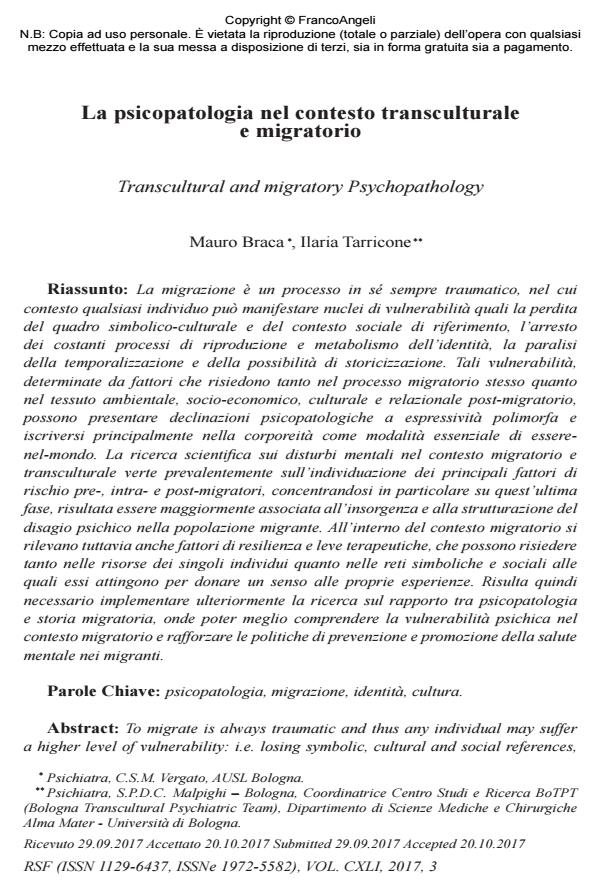La psicopatologia nel contesto transculturale e migratorio
Titolo Rivista RIVISTA SPERIMENTALE DI FRENIATRIA
Autori/Curatori Mauro Braca, Ilaria Tarricone
Anno di pubblicazione 2017 Fascicolo 2017/3
Lingua Italiano Numero pagine 13 P. 9-21 Dimensione file 684 KB
DOI 10.3280/RSF2017-003002
Il DOI è il codice a barre della proprietà intellettuale: per saperne di più
clicca qui
Qui sotto puoi vedere in anteprima la prima pagina di questo articolo.
Se questo articolo ti interessa, lo puoi acquistare (e scaricare in formato pdf) seguendo le facili indicazioni per acquistare il download credit. Acquista Download Credits per scaricare questo Articolo in formato PDF

FrancoAngeli è membro della Publishers International Linking Association, Inc (PILA)associazione indipendente e non profit per facilitare (attraverso i servizi tecnologici implementati da CrossRef.org) l’accesso degli studiosi ai contenuti digitali nelle pubblicazioni professionali e scientifiche
La migrazione è un processo in sé sempre traumatico, nel cui contesto qualsiasi individuo può manifestare nuclei di vulnerabilità quali la perdita del quadro simbolico-culturale e del contesto sociale di riferimento, l’arresto dei costanti processi di riproduzione e metabolismo dell’identità, la paralisi della temporalizzazione e della possibilità di storicizzazione. Tali vulnerabilità, determinate da fattori che risiedono tanto nel processo migratorio stesso quanto nel tessuto ambientale, socio-economico, culturale e relazionale post-migratorio, possono presentare declinazioni psicopatologiche a espressività polimorfa e iscriversi principalmente nella corporeità come modalità essenziale di essere-nel-mondo. La ricerca scientifica sui disturbi mentali nel contesto migratorio e transculturale verte prevalentemente sull’individuazione dei principali fattori di rischio pre-, intra- e post-migratori, concentrandosi in particolare su quest’ultima fase, risultata essere maggiormente associata all’insorgenza e alla strutturazione del disagio psichico nella popolazione migrante. All’interno del contesto migratorio si rilevano tuttavia anche fattori di resilienza e leve terapeutiche, che possono risiedere tanto nelle risorse dei singoli individui quanto nelle reti simboliche e sociali alle quali essi attingono per donare un senso alle proprie esperienze. Risulta quindi necessario implementare ulteriormente la ricerca sul rapporto tra psicopatologia e storia migratoria, onde poter meglio comprendere la vulnerabilità psichica nel contesto migratorio e rafforzare le politiche di prevenzione e promozione della salute mentale nei migranti.
Parole chiave:Psicopatologia, migrazione, identità, cultura.
Mauro Braca, Ilaria Tarricone, La psicopatologia nel contesto transculturale e migratorio in "RIVISTA SPERIMENTALE DI FRENIATRIA" 3/2017, pp 9-21, DOI: 10.3280/RSF2017-003002